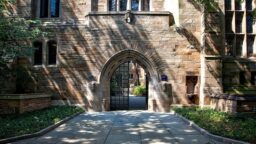After mulling it over for months, Yale University announced that it will invite students back to campus in August with a long list of health protocols in place, including mandatory COVID-19 testing for all students and faculty members and staff who will be interacting with students.
There are some stipulations, though.
This upcoming academic year, all graduate and professional students are welcome to live on campus. However, for each semester, only three of the four undergraduate classes will have the option to move back.
For fall semester, Yale will welcome freshmen, juniors and seniors to live on campus. And in the spring, sophomores, juniors and seniors will have the option to live on campus.
This will allow Yale to decrease the undergraduate student population living on campus by 40 percent and lower the risk of spreading COVID-19, according to a detailed message sent to the Yale community from President Peter Salovey and Provost Scott Strobel.
Nearly all classes will still be taught online, according to the message. That way, undergraduate students who don’t return to campus can still take classes. There will be in-person courses only in some cases, such as certain discussion sections, labs, studio courses and collections-based courses.
“Now more than ever, the world needs the very best from Yale,” Salovey and Strobel said in a news release. “With great care for everyone’s well-being, we must do all that we can to continue to create knowledge and educate the next generation.”
In addition to enforcing mandatory viral testing, Yale is taking a number of precautionary measures to minimize the potential spread of COVID-19 on campus.
The university is enforcing mandatory training for everyone returning to campus and requiring that students wear masks and practice social distancing. It’s limiting events and group gatherings, and it is strongly discouraging travel, among other things. Any student coming from abroad or any state with a high prevalence of COVID-19 is required to quarantine for 14 days.
Throughout the school year, undergraduate, graduate and professional students living in dormitories are subject to COVID-19 tests every week. Graduate and professional students living off campus will be tested at the start of every semester.
If, at any point, a student tests positive for COVID-19, they will be forced to quarantine for at least 14 days, and the university asks that their “close contacts” do too. Those living on campus will be sent to isolate themselves in separate university housing.
Since April, the number of COVID-19 cases in Connecticut has greatly decreased, which, in part, is what made Yale feel comfortable inviting students back to campus. In making this decision, the university is joining hundreds of other institutions.
But, there’s still no vaccine for COVID-19. And from the rising cases in Georgia, North Carolina, Texas and many other U.S. states, it’s become clear that when states relax guidance, COVID-19 comes back with a vengeance.
And college campuses are already appearing to be hotbeds for virus spreading. Just yesterday, the University of Georgia announced that 154 people on campus — both students and faculty — have tested positive for COVID-19. And fall semester hasn’t even started yet.
Still, Yale is confident in its decision to invite students back to campus.
“These decisions are possible because of the continued decline in community transmission of COVID-19 in Connecticut, the creation of a university-wide COVID-19 screening program, and the implementation of other health and safety actions,” Salovey and Strobel’s message states.
They go on to add, though, that they understand COVID-19 has not left Connecticut for good, and that keeping the number of cases down will require a great deal of effort and consideration.
“Although the rates of COVID-19 hospitalization and death have declined in Connecticut, this pandemic is not over,” the message states. “The public health crisis continues to demand self-discipline, personal responsibility, prioritizing the common good over individual preferences, a spirit of cooperation, and resilience. The Yale community rises to every challenging time with spirit and optimism, and we know this moment will not be different.”



